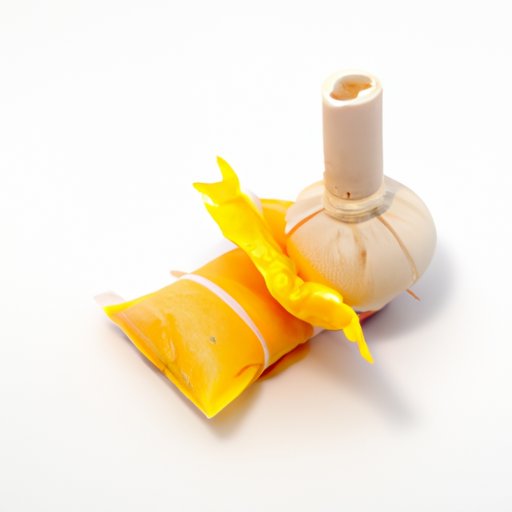
I. Introduction
A boil is a common skin problem that is caused by a bacterial infection. It appears as a red, swollen, and painful lump on the skin that is filled with pus. Boils often occur on the face, neck, armpits, buttocks, and thighs. Boils can cause discomfort and pain, and they can be stubborn to heal if left untreated. In this article, we will explore how to get rid of a boil fast using natural remedies, over-the-counter ointments, medical procedures, and prevention measures.
II. Herbal Remedies
Natural remedies are an effective way to treat boils. Some of the common herbal remedies that can be used to get rid of boils fast include:
Tea Tree Oil
Tea tree oil has antibacterial and antiseptic properties that can help to kill the bacteria causing the boil. To use tea tree oil, mix a few drops of the oil with a carrier oil like coconut oil or olive oil. Apply this mixture directly on the boil and cover it with a bandage. Repeat this process two to three times a day until the boil drains and heals.
Turmeric
Turmeric is an herb that has anti-inflammatory and antimicrobial properties that can help to reduce the swelling and pus in the boil. To use turmeric, mix a teaspoon of turmeric powder with a small amount of water to form a paste. Apply the paste on the boil and leave it for 20-30 minutes before washing it off with warm water. Repeat this process two to three times a day until the boil disappears.
Neem
Neem is an herb that has antibacterial, anti-inflammatory, and analgesic properties that can help to reduce the inflammation and pain associated with the boil. To use neem, crush a few neem leaves to create a paste and apply it directly on the boil. Cover it with a bandage and leave it for a few hours before washing it off with warm water. Repeat this process two to three times a day.
Garlic
Garlic is an herb that has antimicrobial properties that can help to kill the bacteria causing the boil. To use garlic, crush a few cloves of garlic to create a paste and apply it on the boil. Cover it with a bandage and leave it for a few hours before washing it off with warm water. Repeat this process two to three times a day until the boil drains and heals.
Caution: If you have sensitive skin, test any herbal remedy on a small area first to make sure you don’t have an allergic reaction. Also, some people may experience side effects such as irritation, redness, and burning sensations after using any of these herbal remedies.
III. Warm Compress
A warm compress is an easy and effective way to drain the boil and speed up the healing process. A warm compress can also help to relieve the pain and discomfort associated with the boil. To make a warm compress, soak a clean cloth in warm water and wring out the excess water. Place the warm compress on the boil for 10-15 minutes. Repeat this process two to three times a day until the boil drains and heals.
Note: The warm compress should be warm, not hot. Do not overheat the water to avoid burns or scalds.
IV. Over-the-Counter Ointments
Over-the-counter ointments can help to speed up the healing process and reduce the pain and inflammation associated with a boil. Some of the common over-the-counter options include Ichthammol or drawing salve. Ichthammol is a black ointment that can help to draw out the pus from the boil and reduce inflammation. To use Ichthammol, apply a small amount of the ointment on the boil and cover it with a bandage. Repeat this process two to three times a day until the boil heals.
Caution: Over-the-counter ointments are safe to use but can cause skin irritation and redness in some people.
V. Medical Procedures
If home remedies do not work, or if the boil is very large or painful, a medical procedure may be necessary. There are two common medical procedures to treat a boil:
Incision and Drainage
This procedure involves a doctor making a small cut in the boil to drain the pus. The doctor will use local anesthesia to numb the affected area before making the incision. After draining the pus, the doctor will pack the wound with sterile gauze to prevent infection and speed up the healing process.
Antibiotics
If the boil is caused by a bacterial infection, antibiotics may be necessary to treat the infection. A doctor may prescribe antibiotics in the form of pills or creams to treat the boil. It is important to take antibiotics as prescribed and to complete the full course of medication to prevent a recurrence of the infection.
Note: Medical procedures should only be performed by a licensed healthcare provider. If you experience any symptoms of infection, such as fever, extreme pain, or redness/spreading of the boil, you should seek medical attention immediately.
VI. Prevention Measures
The best way to prevent a boil is to maintain good hygiene and healthy habits. Tips for preventing boils include:
Maintain Cleanliness
Take a shower regularly and wash your clothes and bedsheets often. Avoid sharing personal items like towels and razors with others.
Practice Good Skin Care
Keep your skin healthy and moisturized. Avoid using harsh chemicals or abrasive scrubs on your skin.
Healthy Habits
Eat a healthy diet and exercise regularly. Avoid smoking and excessive alcohol intake.
VII. Conclusion
Boils can be a painful and annoying skin problem, but with proper care and treatment, they can be treated quickly and effectively. Natural remedies, over-the-counter ointments, and medical procedures can all be used to get rid of boils fast. Preventing boils from occurring is also important and can be achieved by maintaining good hygiene and healthy habits.
If you have a boil that is not responding to home remedies, seek medical attention from a licensed healthcare provider.




